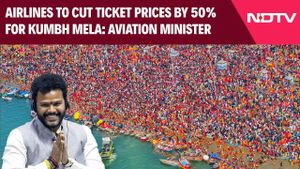New Delhi: Prime Minister Narendra Modi has made significant assertions about the upcoming Budget 2025, stating it is crafted to fulfill the aspirations of the common man, particularly focusing on the poor, farmers, women, and youth. This declaration, made during a recent Cabinet meeting, set the scene for what is anticipated to be a budget laden with economic relief and progressive policy reforms.
The Cabinet, which includes key figures like Finance Minister Nirmala Sitharaman and Minister of State (Finance) Pankaj Choudhary, approved the Union Budget. This move is seen as pivotal just before the budget presentation, highlighting the government’s commitment to addressing the diverse economic challenges confronted by various segments of society.
Prime Minister Modi reiterated, “The Budget 2025 is aimed at fulfilling the aspirations of the poor, farmers, women, and youth,” reflecting the administration’s broader vision for uplifting these demographics. This announcement also points to the strategic direction the government aims to take as it introduces income tax reforms and policy measures aimed at stimulating the agricultural sector and promoting technologies like artificial intelligence.
With the impending presentation of this budget, the government's agenda is getting closely watched, especially against the backdrop of rising living costs and stagnant income levels. The Economic Survey, which was tabled prior to the budget introduction, has forecasted a growth rate of between 6.3% and 6.8% for the following financial year, aligning with aspirations for long-term sustained growth close to 8% annually for at least the next decade.
Political responses, particularly from opposition figures, emerged swiftly. Karnataka Minister Priyank Kharge criticized Modi, expressing skepticism and highlighting the grim realities of increasing unemployment and the enduring farmer protests over issues like Minimum Support Price (MSP). This sentiment reflects concerns not just for the budget but broader economic policies, where many believe small and medium enterprises have been overlooked.
On the other hand, as the budget anticipated relief measures including income tax exemptions, the opposition found itself engaged with unfortunate events surrounding the recent Maha Kumbh stampede. During discussions, opposition MPs expressed disappointment over perceived neglect of serious issues affecting those who attended this major religious event. Reports indicated approximately 30 fatalities, leading to demands for transparency and accountability from the government about the incident.
Dimple Yadav, Samajwadi Party MP, voiced her concerns passionately, stating, “Nothing new was there in the budget. Samajwadi Party demands the government to give the details of all those devotees who lost their lives in Maha Kumbh,” calling for focus not just on economic metrics but also on humanitarian aspects following tragedies.
The budget's release has been embroiled with discussions about what appears to be skewed priorities favoring certain regions—particularly Bihar, where polls are approaching—while neglecting others, such as Punjab, where farming communities are still grappling with unresolved grievances. Shiromani Akali Dal MP Harsimrat Kaur Badal criticized the budget, saying, “This was an anti-farmer Budget. Farmers who are fighting for their rights were not heard,” capturing the sentiment of many who feel disenfranchised by current policies.
Critiques of the budget extend beyond economic metrics, with Congress MP Shashi Tharoor questioning, “What happens if we don't have a salary? Where is the income going to come from?” These statements reflect wider anxieties about the employment crisis, exacerbated by the pandemic and the slow recovery of economic opportunities.
Lastly, the voice of the opposition, led by figures like Samajwadi Party chief Akhilesh Yadav, underscored the urgency of addressing the recent tragedy, emphasizing the necessity of accountability over economic announcements, thereby framing the budget not merely as financial legislation but also as part of the broader social contract with the citizens.
Akhilesh remarked, “The death toll is falsely stated by the government,” pushing for clarity and action on issues he deems more pressing than tax calculations. Such statements not only highlight the political divide but also the government’s responsibility to its citizens during moments of crisis.
Overall, as Budget 2025 approaches its presentation, it carries the weight of expectations and scrutiny. The focus on alleviating financial burdens combined with the stark realities of contemporary issues like the Maha Kumbh tragedy suggests this budget will be far more than just numbers on paper; it is about lives, livelihoods, and public sentiment.



